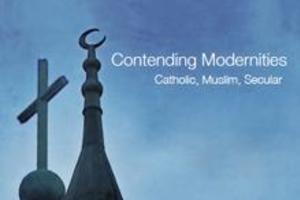
The global research initiative Contending Modernities — designed to examine Catholic, Muslim, and secular interaction in the modern world — has advanced to a new level this academic year. Directed by Kroc Institute director Scott Appleby, the initiative was formally launched in New York in November 2010, following a major grant from the University of Notre Dame’s Provost’s Strategic Research Initiative.
The first two Contending Modernities working groups are well underway, involving more than two dozen scholars from around the world.
Science & the Human Person, under the leadership of Abdulaziz Sachedina of George Mason University and Thomas Banchoff of Georgetown University, includes ethicists, legal scholars, scientists, doctors, political scientists, theologians, Islamicists, and anthropologists. The group gathered at Georgetown last November and will hold conferences at Notre Dame in May 2013 and in Oman in 2014. Its work is funded in part by grants from the Henry Luce Foundation and from the Religion and Innovation in Human Affairs Grant Program of The Historical Society, Boston.
Global Migration & the New Cosmopolitanism is dedicated to understanding and advancing collaboration among religious and secular groups striving to promote public ethics and civic associations. Within this group, Robert Hefner of Boston University is supervising a team of researchers comparing efforts to assimilate immigrants and promote citizen education in Paris, Amsterdam, Los Angeles, London, and Montreal. Vincent Rougeau, Dean of the Boston College Law School, is collaborating with Rev. Angus Ritchie of London’s Contextual Theology Centre to lead a research team examining London Citizens, Citizens United, and other organizations that bring Catholic, Anglican, Muslim, Sikh, and other religious communities into partnership with secular civil society. The team has produced several publications and will hold an international conference in London in September 2013.
This spring the Contending Modernities steering committee, in partnership with the Social Science Research Council, is hosting consultations for the purpose of forming working groups in the 5 remaining research clusters: Gender, State, and Society; Authority, Community, and Identity; Governance and Citizenship; Human Development and the Globalizing Economy; and Deadly Violence and Conflict Transformation.
The team at Notre Dame
At Notre Dame, the Contending Modernities team now includes (in addition to Appleby) Paola Bernardini, associate director for research, James Adams, research associate and editor of the Contending Modernities blog, and Emmanuel Katongole, a Catholic priest and theologian from Uganda and an expert on reconciliation in Africa. Father Katongole was recently appointed to the Notre Dame faculty through one of three faculty lines granted to Contending Modernities from the Provost’s Strategic Research Initiative.
Contending Modernities supporters Susan Scribner Mirza, Lise Strickler, and Mark Gallogly made possible the awarding of eight Summer Language Abroad grants to Notre Dame undergraduates studying Arabic in Jordan and Oman.
Not least, Contending Modernities recently launched a new website to serve as a portal to its scholarly and public education work, including the Contending Modernities blog.
“Recent events around the world—from Syria to Rome, from Silicon Valley to Pakistan—underscore the vital importance of research that seeks to understand the interactions between religious and secular forces shaping our age,” says Appleby. Contending Modernities continues to grow as an interdisciplinary initiative designed to comprehend such interactions and identify collaborative paths forward.”
Contact: Scott Appleby, 574-631-5665, rappleby@nd.edu